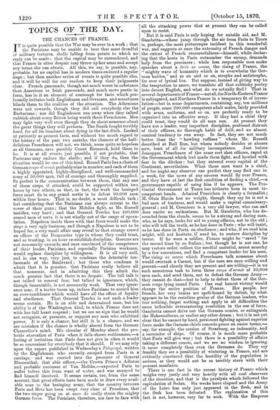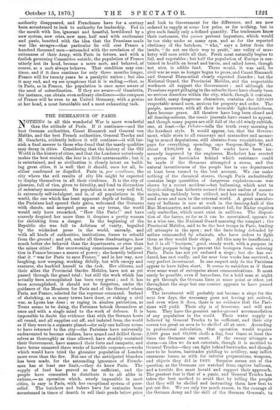THE CHANCES OF FRANCE.
IT is quite possible that the War may be over in a week ; that the Parisians may be unable to bear that most dreadful of military tortures, shells falling from points to which no reply can be made ; that the capital may be surrendered, and that France in utter despair may throw up her arms and accept any terms she can obtain. All this, we say, is possible, nay, probable, for no capital has in modern times endured a regular siege ; but then another series of events is quite possible also, and it will be well for our readers to keep their judgments clear. French gasconade, though not much worse in substance than American or Irish gasconade, and much more poetic in form, has in it an element of contempt for facts which pro- foundly irritates both Englishmen and Germans, and sometimes blinds them to the realities of the situation. The Athenians were not cowards, though they did call everybody else the Barbarians ; nor did Englishmen run away when they talked rubbish about every Briton being worth three Frenchmen. Men may fight very well even though they do shout nonsense about the great things they will perform. The South fought terribly hard, for all its bombast about dying in the last ditch. Looked at patiently as present facts, and without too much regard to the history of the past two months, the chances of the half- delirious Frenchmen will not, we think, seem quite so hopeless as all Germans, save possibly Count Bismarck, hold them to be. It is at all events just possible, if not probable, that Parisians may endure the shells ; and if they do, then the situation would be one of this kind. Round Paris lies a chain of German corps d'arme'e probably nine in number, and each of them a highly appointed, highly-disciplined, and well-commanded army of 30,000 men, full of courage and thoroughly supplied. So perfect is the communication between them, that any one of these corps, if attacked, could be supported within two hours by two others, so that, in fact, the work the besieged force must do in any grand sortie is to defeat 90,000 men within four hours. That is, no doubt, a most difficult task ; but considering that the Parisians can always retreat to the cover of their guns ; that the Mobiles fight, as Mr. Russell testifies, very hard ; and that General Trochu has 400,000 armed men of sorts, it is not wholly out of the range of specu- lation. Napoleon inside there with that force would make the siege a very ugly business, and though a Napoleon is not to be hoped for, a very small affair may reveal to that strange crowd an officer of the Dumouriez type in whom they could trust, and so trusting, in an hour re-establish discipline. Gascons are not necessarily cowards, and once convinced of the competence of their leader, Parisians, and especially Parisian workmen, would replace discipline by willingness. It is all very well, and in one way, very just, to condemn the detestable fan- faronade of the Boulevard ; but those who condemn it admit that it is genuine, that Parisians really believe all that nonsense, and in admitting this they admit the much greater fact that there is no despair. The tall talk is not talked to conceal fear, but talked in ignorance, which, though lamentable, is not necessarily weak. That very ignor- ance may, if a leader turns up, induce Parisians to accord him an over-confidence which would have all the effect of loyalty and obedience. That General Trochu is not such a leader seems certain. He is an able and determined man, but his ability is of the Washington kind, to which France does not with her full heart respond ; but we see no sign that he would not recognize, or promote, or support any man who exhibited power. It is only a chance, but still it is a chance, and we are mistaken if the chance is wholly absent from the German Chancellor's mind. His circular of Monday about the pro- bable starvation of Paris when it falls shows restlessness,—a feeling of irritation that Paris does not give in when it would be so convenient for everybody that it should. If we may rely upon the report published in Wednesday's Telegraph, written by the Englishman who recently escaped from Paris in a carriage, and was carried into the presence of General Blumenthal, that able officer,—the Crown Prince's Adlatus and probable successor of Von Moltke,—expected Paris to suffer before this from want of water, and was annoyed to find himself deceived. It seems certain, too, from the same account, that great efforts have been made to draw every avail- able man to the besieging army, that the country between Paris and Metz has been swept very clear of Prussians, that the two sieges going on at once do really strain the mighty German force. The Parisians, therefore, are face to face with TOPICS OF THE DAY. all the attacking power that at present they can be called
upon to resist.
But it is said Paris is only hoping for outside aid, and M. Gambetta—whose jump through the air from Paris to Tours is, perhaps, the most picturesque incident in this wonderful war, and suggests at once the extremity of French danger and the extent of French resourcefulness—himself, while declar- ing that the hosts in Paris outnumber the enemy, demands. help from the provinces ; while less responsible men make speeches about a levee en 2nasse, the rising of France, the: " mighty wave of humanity which is to overwhelm the Ger- man hordes," and so on and so on, strophe and antistrophe,, for ever of lyrical lies. But suppose, instead of giving way to. the temptation to sneer, we translate all that rubbishy poetry- into decent English, and what do we actually find ? That in several departments of France—not all, for North-EasternFrance is subjugated, and Northern France in a temporary fit of irreso- lution—but in some departments, containing, say, ten million of people, some 200,000 competent adult males, fairly provided with arms, uniforms, and so on, are perfectly ready to bee organized into an effective army. If they had a chief they could trust, they would do all men can. At prelient they have not a leader, very imperfect discipline, profound distrust. of their officers, no thorough habit of drill, and an almost. comical tendency to run away. In fact, they are not much better than the "howling ruffians" whom Mr. Russell described at Bull Run, but whom nobody derides or abuses. now, least of all for military incompetence. Just before Jemappes, Frenchmen of the same sort shot officers, raged at. the Government which had made them fight, and howled with_ fear in the ditches ; but they entered every capital of the. Continent, nevertheless. What these men want is a chief,. and for aught any observer can predict they may find one in a week, for the news of any success would fly over France, and they have at last the first condition of finding a chief,—a. government capable of using him if he appears. The Pro- vincial Government at Tours has hitherto been in most in- competent hands. Admiral Fourichon is clearly a formalist ; M. Glais Bizoin has no weight, though they say he is not a bad man of business, and would make a capital commissary- general ; and M. Cremieux is a very old lawyer, who can and does excite no enthusiasm. But M. Gambetta, who has de-- scended from the clouds, seems to be a strong and daring man,. who, as he says, looks for aid to young officers, not to the old ;. who will tell the truth, as he has done in Paris ; who will insist,. as he has done in Paris, on obedience ; and who, if we read him. aright, will not hesitate, if need be, to restore discipline by terror. If he were a soldier, France might be " saved " for the second -time by an Italian ; but though he is not one, he. may restore order, collect the needful material, arrest anarchy by a few executions, and find a competent leader for his men. The rising en masse which Frenchmen talk nonsense about.
would overtask a Carnot, but if the men are once willing and present—and clearly they are present and are willing—it is no such monstrous task to form three corps d'arme'e of 30,000 men each, and send them, not to defeat the German Army— they cannot do that—but to help to defeat three of the Ger- man corps lying round Paris. One real honest victory would. change the entire position of France. Her people, her friends, her very brains are spell-bound by defeat, by what.
appears to be the resistless genius of the German leaders, who fear nothing, forget nothing, and apply to all difficulties the same inflexible overmastering resolution in the use of force.
Gambetta cannot drive out the German armies, or extinguish the Hohenzollerns, or realize any other dream ; but it is not yet clear that he cannot by hard, persistent fighting against superior
force make the German chiefs concede peace on easier terms,—
say, for example, the cession of Strasburg, an indemnity, and a surrender of ships. Of course, it is much more probable that Paris will give way ; but there is a possibility of affairs taking a different course, and we see no wisdom in ignoring it more completely than even the Germans do. They say frankly they see a possibility of wintering in France, and are evidently convinced that the hostility of the population is serious, or they would not be so terribly stern with their peasant assailants. There is one fact in the recent history of France which weighs very justly and very heavily with all cool observers of the situation, and that is the paralysis which followed the capitulation of Sedan. Six weeks have elapsed and the Army of the Loire has only just appeared in the flesh, and in the flesh has been defeated. The explanation of this fact is not, however, very far to seek. With the Emperor
Authority disappeared, and Frenchmen have for a century been accustomed to look to authority for leadership. Fed to the month with lies, ignorant and boastful, bewildered by a new system, new cries, new men, half mad with excitement and panic, besotted with the idea that the Prussians made war like savages—that particular lie will cost Prance a 'hundred thousand men—astounded with the revelation of the ,rottenness of their Army, with Paris in fetters, and with a foolish governing Committee outside, the population of France -utterly lost its head, became a mere mob, and behaved, of -course, as a mob always behaves. That condition may con- tinue, and if it does continue for only three months longer, France will for twenty years be a paralytic nation ; but also -it may end, and we see symptoms that it is ending,—that, as -in Paris, so in France, the population is once more aware of the need of subordination. If they are aware—if Gambetta, for instance, can obtain even ordinary obedience—the conquest -of France will be even to an United Germany, with a genius at her head, a most formidable and a most exhausting task.































 Previous page
Previous page